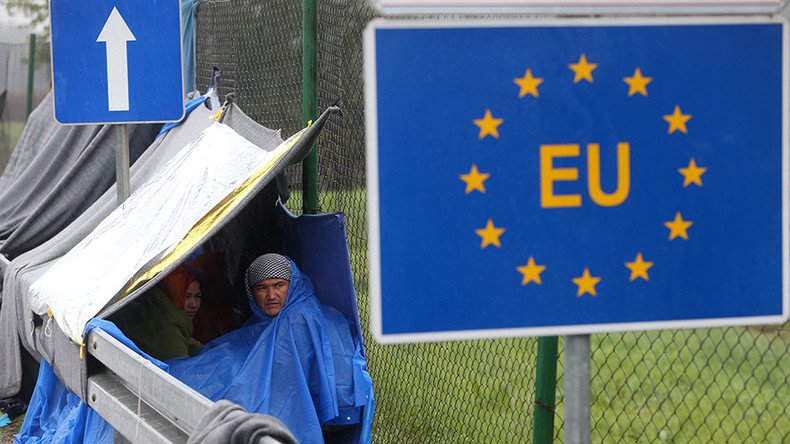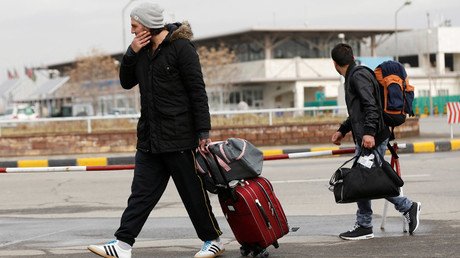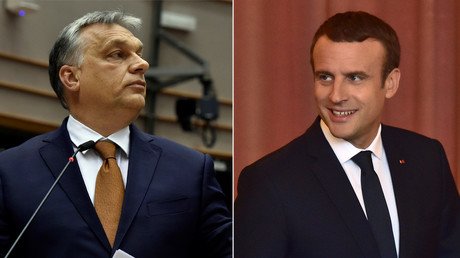EU to pressure refugees’ home countries with visa restrictions to make them take back their citizens

Countries unwilling to take back citizens that arrived in Europe via irregular channels will face EU visa restrictions. The migration crisis remains one of the prime irritants in the bloc, with some members highly critical of how Brussels has handled it.
The decision to apply pressure through visa restrictions was taken during the two-day summit of EU leaders that ended in Brussels on Friday, Reuters reported. The agency named Bangladesh and Nigeria as potential targets for such measures.
The EU considers many of the people seeking asylum in member countries to be economic migrants and seeks to send them home. Under European rules, this would be tricky with refugees that fled countries like Syria, where peoples’ lives could be in danger.
The union can send people back to safer countries, but some are reluctant to take back their citizens.
“We can use visas to convince them to take returns,” a senior EU diplomat told the news agency, explaining that the ruling elites of these countries would be more willing to take back migrants if they would be banned from visiting Europe otherwise.
The conclusions published by the European Council secretariat after the meeting mention “using all possible levers, including by reassessing visa policy towards third countries” to deal with the readmission issue, but do not elaborate further.
The EU has faced a spike in arrivals of asylum seekers from North Africa, the Middle East, and Asia since 2014. The initial response championed by German Chancellor Angela Merkel was to open the door to the refugees, but the problems associated with providing shelter and aid to hundreds of thousands of people in need of help setting up their new lives have taken their toll on public opinion. Brussels is now seeking to curb the inflow.
In order to do this, the EU sealed a shaky deal with Ankara to prevent refugees from reaching Europe from Turkey, which has now made Libya the primary point of departure for asylum seekers.
Where do most #refugees come from? See below. EU spends 87% of its humanitarian budget helping forcibly displaced people. #WithRefugeespic.twitter.com/uNtV8oCkAQ
— EU Humanitarian Aid (@eu_echo) June 22, 2017
The UN’s migration agency estimates that around 70,000 people have arrived in Italy from Libya so far this year, compared to around 56,000 during the same period last year. The journey in shaky boats is very dangerous, and almost 1,900 people have died trying to cross the Mediterranean in 2017.
“Loss of life and continuing migratory flows of primarily economic migrants on the Central Mediterranean route is a structural challenge and remains an issue of urgent and serious concern,” the EU leaders said in their final statement as they pledged more aid and training for the Libyan coast guard.
However, the North African country remains in disarray in the wake of the chaos wrought by a NATO-supported rebellion in 2011. The lack of stability, with various armed groups and two competing governments vying for power, has allowed the business of people smuggling to thrive in Libya.
The issue of refugees has sparked a heated exchange between EU newcomer leader Emmanuel Macron of France and some Eastern European countries, which are unwilling to accept the quota of refugees mandated by Brussels. Macron has criticized eastern European leaders for what he called taking the EU for a supermarket, meaning taking Brussels’ money without sharing the union’s values.
He also defended the policy of accepting refugees in the EU as “brave,” though Merkel herself has since admitted that it was a mistake.
“We must welcome refugees because it is our tradition and our honor. The refugees are not just any migrants, not economic migrants. They are people who are fleeing their country for freedom because of the war or the political situation,” he said at a joint conference with the German chancellor.
He also acknowledged that France has been impacted by the crisis less than some other countries, saying the refugees see it as a less attractive due to its poor economic situation and 10 percent unemployment rate.
“The countries that hosted the largest number of migrants, let me be frank, it is because they were countries that were doing well, with a low level of unemployment and where migrants considered that they had a future,” he said, adding that he found “no glory” in this situation.














